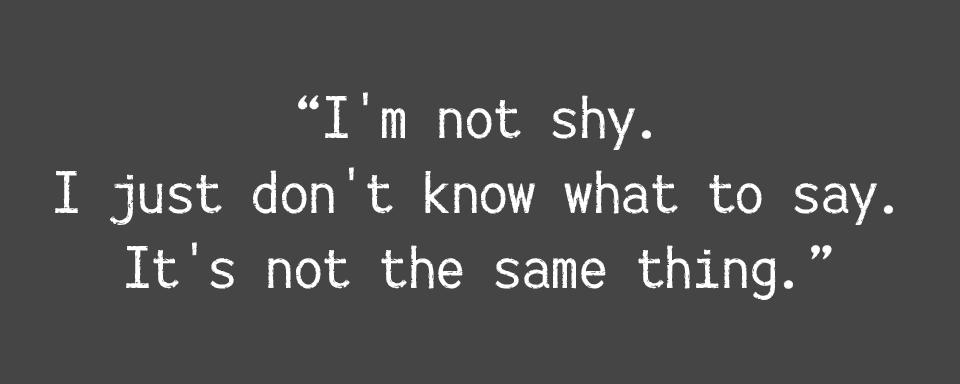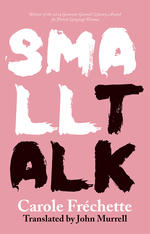
Read an excerpt from Small Talk
Who actually likes small talk? Is anyone actually good at small talk? How does small talk affect our relationships and other ways of expressing ourselves? What if you were someone who was uncomfortable with speaking to other people and every single person in your life was basically a walking jack-in-the-box? Carole Frechétte tackled all of this in her play called—you guessed it—Small Talk, and it’s spot on. And now we have the English translation from John Murrell!
Check out this scene in which our protagonist Julie, a young researcher, runs into a former classmate. Scary stuff!
NARRATOR: Julie walks very fast. Around the corner and right past the coffee shop where she’s supposed to wait for her mother. She disappears down a little side street. In the distance she sees somebody she thinks she knows. She quickly turns away. But it’s too late.
A young woman walks up to Julie.
EMILY GOODMAN: Julie?
Julie stops in her tracks.
Julie, is that you?
JULIE: No, I . . . Yes.
EMILY GOODMAN: Don’t you recognize me? Emily Goodman. Central High School. Grade ten. We were in the same social studies class.
JULIE: I . . . I don’t know.
EMILY GOODMAN: We had to do that research project together. Remember? “Investigate a serious societal problem of your own choice.”
JULIE: Oh . . . Yes, maybe.
EMILY GOODMAN: I suggested the doping of Olympic athletes, but you wanted to explore the meaning of human existence. You were always sort of strange. You wanted us to make a list of our top ten questions about life. Remember? But eventually we settled on Olympic doping, and you were so great in our presentation to the class. Everybody was surprised that someone as shy as you—
JULIE: I’m not shy.
EMILY GOODMAN: I mean, a girl who never talked much. To anybody. Always in a corner, at the back of the class.
JULIE: I’m not shy. I just don’t know what to say. It’s not the same thing.
EMILY GOODMAN: Not sure I see the difference, but—
JULIE: It’s not the same. Never mind. I . . . I ought to . . . Well, it was really nice to—
EMILY GOODMAN: Wait! What’s become of you?
Pause.
JULIE: What’s become . . . ? Oh, I . . . You know . . . I work.
EMILY GOODMAN: You work around here?
JULIE: Oh, no. Nowhere near. In a lab.
EMILY GOODMAN: And do you enjoy it?
JULIE: I enjoy . . . interacting with the microscope.
EMILY GOODMAN: What?
JULIE: My eye fastened to the lens. As though nothing else exists. Nothing except the molecules, struggling, living, dying.
EMILY GOODMAN: Oh. Well, that’s . . . That must be intriguing.
Pause.
JULIE: Yes. Sorry, but there’s my bus.
EMILY GOODMAN: Where?
JULIE: I mean, it’ll be here soon.
EMILY GOODMAN: Okay. But, since you ask, I did my bachelor’s in physical education. I do personal training at a gym down the street. I love it. I get to meet so many people.
JULIE: Interesting. But I really should go. My mother will be waiting for me. I almost forgot about her.
EMILY GOODMAN: Your mother?
JULIE: Yes. She sings in an amateur chorus. She’s meeting me at the coffee shop, but she won’t be able to order. She’ll say “rocklet” instead of “chocolate.” I’m running late and there’s my bus—
EMILY GOODMAN: Sure, go ahead, run after your bus, which doesn’t exist, because buses don’t even run on this street. Run to meet your mother, who isn’t waiting for you, because she died in a traffic accident several years ago. Esther Sondergard told me all about it. A big Mac truck rolled over onto her compact. Apparently she was in a coma for several days. And, if you’d been even a little bit friendly, I would’ve extended my sympathies. I’m extremely sensitive, not that you care, and I’m sure it must be tragic to have your mother crushed by a Mac truck, but you don’t give a goddamn what I think or what I feel. You have no interest in other people. You never were interested in anything but yourself and your list of questions you’d like to ask about life. You were always a terrible snob, Julie.
Emily Goodman leaves. Julie is left alone. When Emily Goodman is far enough away not to hear, Julie shouts in her direction.
JULIE: My mother is not dead! After one week she opened her eyes, opened her mouth, and she spoke, but what came out made no sense. I said to her, “Mom, what has happened to you?” but she couldn’t understand me.
Interested in more of Julie’s encounters? Get your copy of Small Talk now!



Comments